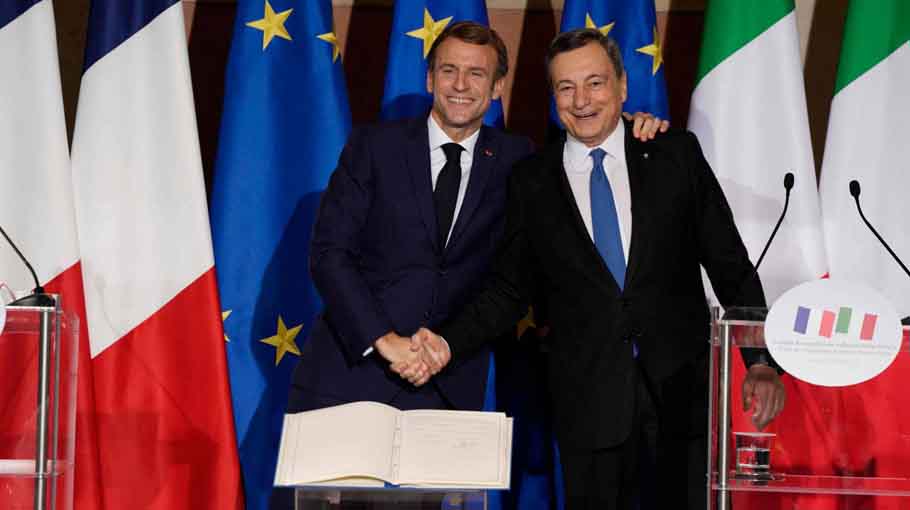Will this Franco-Italian bromance save Europe?
Both leaders are bankers see the world through the optics of global finance, where the EU underperforms


Emmanuel Macron and Mario Draghi signed a treaty on Friday at the Quirinale palace in Rome to get France and Italy working together better. That’s good news for Europe. It’s also tinder for populists. How their countries — both founding members of the European Union — pull off cooperation will determine how much nearer the continent’s dream of “ever closer union” gets to reality.
France and Italy share a border and coasts on the Mediterranean and have interlocking histories on both sides of that sea. Their culture and style are admired abroad even as their citizens register a sense of decline at home.
The commonalities have not always guaranteed harmony. In the past five years, the two countries have fallen out over Libya, banks, shipbuilding, populism and the Mona Lisa among other things. In 2019, Paris recalled its ambassador after Italy’s then deputy prime minister, Luigi di Maio, of the populist Five Star Movement met in solidarity with gilet jaunes protesters who were raising havoc in France.
Meanwhile, Italy has in the recent past gotten little respect in Brussels, says Mathilde Ciulla of the European Council of Foreign Relations. The country’s short-lived governments and a revolving door of junior bureaucrats led to more frustration than continuity. The feeling was mutual. At one meeting I attended in Italy’s finance ministry in 2016, a senior official summed up the Franco-Italian relationship like this: “We’ve just had enough of French bullsh-t.”
That’s changing with Macron and Draghi. Both are bankers and see the world through the optics of global finance, where Europe underperforms.The two are also widely seen to have built a relationship stronger than any leaders of their countries since World War II. It’s based upon a shared view that post-pandemic Europe requires greater integration to face challenges from the U.S. and China. The duo have met seven times since Draghi became prime minister in February. According to Bocconi University’s Carlo Alberto Carnevale Maffe — an expert in European commercial integration — “there are no two better friends, no better personal relationship in Europe today, than Macron and Draghi.”
The treaty is an overdue return to an alliance between France and Italy. In some pro-Draghi quarters in Italy, the Quirinal Treaty is being described in hyperbolic tones as the first chapter in a new Treaty of Rome, the 1957 agreement that brought about the creation of the European Economic Community that’s the basis for today’s EU. It is also openly modeled on is the agreement Germany and France struck in 1963, which helped propel integration further. The hope is the new treaty will produce a similar momentum.
There are beneficial synergies. Italy’s geopolitical status is heightened by closer association with France — which has a seat on the United Nations Security Council and is the EU’s only nuclear power. Corporate tie-ups already exist — and are likely to continue. Auto and automotive parts manufacturing is increasingly Franco-Italian because of Stellantis NV, the mega-marriage of Peugeot and Fiat Chrysler. Pharmaceutical companies are now often trilateral, sprawling across Italy, France, Germany.
There will continue to be obstacles. Lega leader Matteo Salvini and the conservative Italian media are agitated over French acquisitiveness, such as luxury conglomerates LVMH Moet Hennessy Louis Vuitton SE and Kering SA sweeping up Italy’s creative hub of family firms. Indeed, corporate Francophobia inspires a big chunk of right-wing journalist Mario Giordano’s hysterical book “Italy Is No longer Italian: How the New Marauders Are Stealing Our Country.” It’s also evident in boardrooms: The French conglomerate Vivendi is the largest shareholder of Telecom Italia, the country’s phone services provider, but has not been able to exert influence over its governance because of the unpopularity of its owner, corporate raider Vincent Bollore.
Meanwhile, both Macron and Draghi face political challenges. The French president is up for election next year, although current polls see him keeping his job. Draghi is entering increasingly tough territory getting his fractious “unity government” to back reforms necessary for Italy to get its more than €200 billion ($225.2 billion) handout from Brussels. Italy also faces presidential elections next year. The big unknown is whether Draghi will try to win that office and give up the role of prime minister, which in any case ends in 2023 when the current legislature expires. He is known to want the presidency.
The Twitter parlor game of trying to come up with a Brangelina-like moniker for the new political power couple of Europe is already in a froth in anticipation of a longer-term relationship. “Dracron” is currently gaining traction. Still, given the challenges, “Maghi” may be more apt. As well as putting Macron first — and a nod to the greater weight France is inevitably going to have in any partnership — it also means “magicians” in Italian. Wizardry is what both men need to transform Europe.
Rachel Sanderson is a freelance correspondent.

